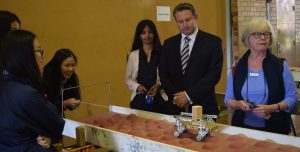
Young people today face a completely new set of challenges in getting the education, training and skills they need to get a good, stable job from those faced by any previous generation, writes MP GREG WARREN:
The days are long gone when anyone could leave school after year 10, enter the workforce and remain in the same job until retirement.
In our rapidly changing economy, technological advancements and innovations are seeing more blue-collar jobs being lost to automated processes.
This is particularly so in manufacturing and similar sectors, where Australian job numbers have declined steeply over the past two or three decades.
This presents significant challenges for our nation, but those challenges are countered with significant opportunities for new jobs in a modern, technological economy.
That is why STEM education is so vital. The Australian Industry Group, which represents some of the largest employers in Australia, in a report entitled Lifting our Science, Technology, Engineering and Maths (STEM) Skills stated:
A key way to meet the emerging challenge of developing an economy for the 21st century is to grow our national skills base – particularly the Science, Technology, Engineering and Mathematics (STEM) skills of our school leavers. Our relative decline of STEM skills is holding back our national economy and causing real frustration for employers.
The task sounds simple enough: Train and educate more people in STEM subject areas to equip them with the knowledge and skills for the jobs of the future.
That job starts in every school across this state and Australia.
If we are to continue the current trajectory with STEM in our schools, we will fail an entire generation.
Our students will not be adequately equipped with the skills and knowledge they need for the twenty-first century economy and associated new jobs.
Across the nation the statistics paint a concerning picture – around 40 per cent of high school teachers who teach these subjects do not have university qualifications in STEM areas; and year 11 and year 12 participation in STEM subjects has fallen to its lowest level in more than 20 years.
It is estimated that 75 per cent of the fastest growing jobs in our economy require STEM training, and the number of jobs in these industries is projected to grow at double the speed of other occupations.
I cannot say conclusively, but I would hazard a guess, that in very few high schools in Australia three out of four students study a STEM subject in years 11 and 12.
We need to get more students, particularly those in year 11 and year 12, to study STEM subjects in high school.
The solution does not end there.
Significant improvements are required to support those studying STEM at university, especially young women who want to pursue a career in STEM.
Women are severely under represented in STEM industries.
 Currently, only 20 per cent of students studying engineering degrees in Australia are women and, even worse, only 14 per cent of students studying information technology degrees are women.
Currently, only 20 per cent of students studying engineering degrees in Australia are women and, even worse, only 14 per cent of students studying information technology degrees are women.
We need to lose the attitude of STEM being a man’s industry.
We will not be able meet the number of graduates required – and we will miss out on some massive economic and job opportunities – if the current rates of female student participation in STEM degrees continue. Our young generation is well equipped with technological savvy. Many probably do not realise how that knowledge and skill can be used to achieve their significant career goals.
More students need to find a STEM subject in which they are interested, whether it be maths, engineering, computer science or any of the natural sciences, and keep at it.
The possibility is there for great job opportunities.
It will not always be easy, but of course anything worth doing is never easy.
Our nation and our world are facing some exciting opportunities in STEM industries, and our schools are the starting point.
I urge our students, schools and communities to embrace those opportunities and to engage in those challenges.
They will carry that education with them throughout their working lives and our local economies will continue to grow.
A strong local economy provides the framework for people to prosper throughout their lives.
*The above was a speech made in state parliament by Mr Warren.



